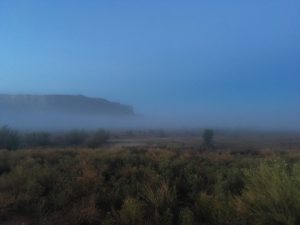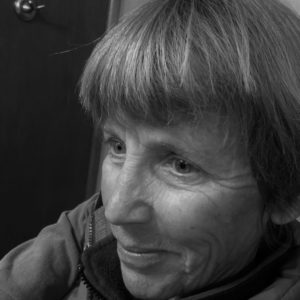My agent, Malaga Baldi, has informed me that you are interested in my novel and its author. I am forty-eight years old, a published writer working under the pseudonym Hereafter Brown. I have never worked under a pseudonym before but the publishing climate of 2001 is different than when I began to write. As the emphasis now is on new names and first novels, in the course of writing Crossing Bully Creek it occurred to me that I might do the book a favor by becoming an author without a past.
To my surprise, there are satisfactions that come from anonymity. I am a private person, not averse to fame and fortune but also, frankly, more interested in having my work be read than having the details of my life be known. However, if they must be known in order for the work to be read, I can assure you I am disappointed but willing.
As an experienced author, I know the value of a good editor. I have worked with excellent editors in the past and their comments, suggestions and demands have in all cases improved the manuscripts I brought to them. If you decide to be that editor, Ms Dyssegaard, I look forward to working with you. You may contact me at my home by calling 520 773 4939. We are on Mountain Standard Time.
Sincerely yours,
Hereafter Brown
Ms. Dyssegaard never did respond to my letter and my fourth novel, Crossing Bully Creek, eventually found an editor and publisher elsewhere. But by the time I came across this artifact only a few weeks ago at the bottom of a pile of old papers in a trunk, the same trunk I took to summer camp when I was 12, my interest no longer lay with Ms. Dyssegaard and her ilk, nor with the ups and downs that mark a writer’s career. What interests me now are the words: becoming an author without a past. Becoming a person without a past.
At the time, 17 years ago, when I wrote that letter, I was thinking only of pastlessness as a form of anonymity and anonymity as a form of privacy, a respite from intrusive phone calls and the responsibilities of buying the right outfit to be on Oprah. My job is to write, I might have told Ms. Dyssegaard, not to negotiate the vagaries of the publishing and promotional worlds. Most of all, I considered pastlessness a choice.
Recently, a dear friend of mine has begun to lose her past. This is not something she chose; this is not a strategy to increase her chances of succeeding in a publishing climate unfriendly to old-timers. This is dementia. I choose here not to pick and choose when it comes to labeling this beast. I choose not to be concerned about exact medical terminology and the difference between dementia, Alzheimer’s and cognitive impairment. I don’t care for or care about these terms, nor does my friend. We don’t use these terms. At this point we talk about her “condition.” We speak of her “situation.” I follow her lead and clearly neither of us wants to use the D-word or the A-word. It’s early on in whatever is happening to her, and whatever’s happening to her is happening to us. Language sets things in stone and she and I and all of us who care for her and surround her want to keep the fluidity of fact and truth alive. We want good news and better outcomes to be possible. We don’t want fixed diagnoses of the wrong kind. Neither do we want vague statements from experts like: We know something is going on but we don’t know what. We want the old days. We want to wake up and have this gone. Are we crazy, avoidant, in deep denial? Of course we are.
The path through this hemisphere of our lives when our bodies begin to sputter and fail is cruel it is said, not for sissies. I’d like to confirm that as an absolute truth and add the word terrifying to it. My friend is constantly frightened by what she suddenly doesn’t know—names of people and places; how to work the heater in a car; where she put down her phone or left her glasses, her wallet, her keys. Her past and her present continually drop away, suddenly unavailable to her, like a bookshelf stripped of its books. No reference points, disorientation, a struggle to find words and a persistent feeling of unease—this is the new normal she lives with. A broken compass in a deep fog. A night without stars.
But there’s this: the path we must walk if we are to live is not only grievous, sobering, daunting; it is also remarkably and inexplicably heartbreaking. By which I mean it opens the heart. It tenderizes us. The definition of tenderize is “to apply a process or substance that breaks down connective tissue.” I can sense this process of breaking down occurring not only physiologically in my friend’s brain (a magnificently orchestrated organ we often misperceive as the mind), but in her relationship to her self, to who she feels herself to be. I’m not who I was, she’ll say, and of course it’s true. But luckily she knows as well as I, both of us practicing Buddhists, that she never was who she was. She was always—we are always—the collecting place for all our habits, ideas, preferences; a great big holding tank for the ever-changing causes and conditions that shape our lives.
So who are we if we’re not ourselves? If that question remains unanswered a lot of space opens up. This is not a comfort to someone who is experiencing the onset of dementia, nor does it provide solace for those who are watching, for those who are accompanying. Not yet, at least. My hope is, and maybe this is where the word faith might well be used, my friend and I will find it less and less necessary to compare now to then, to measure our current configurations to whoever we thought we were long ago, and simply experience in present time this devastating, bewildering, catastrophic, subtle and heart-turning shift.
Hereafter Brown never made it to print, unlike the novel she claimed to have written. She didn’t, after all, need to be its author, because its author no longer needed to insulate the present from the past. But for the year I created and inhabited her, was she me? Was I her? Who are we, really?


